Turkey-Syria offensive: Syrian army heads north after Kurdish deal
President Assad’s forces move towards border towns after reaching a deal with Kurdish forces. …
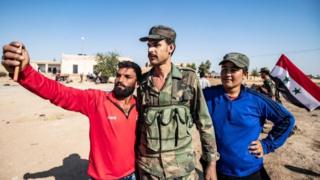
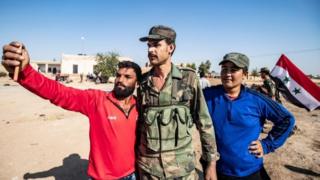 Image copyright AFP
Image copyright AFP Syrian government forces have started to reach the north of the country, hours after the government agreed to help Kurdish forces facing Turkey.
Syrian state media say government forces entered a town about 50km (30 miles) south of the border in order “to confront Turkish aggression”.
The deal came after the US, the Kurds’ main ally, pulled troops from the area.
Turkey began an offensive in the north last week, aiming to drive Kurdish forces from the border region.
Areas under the control of the Kurdish-led Syrian Democratic Forces (SDF) came under heavy bombardment over the weekend, with Turkey making gains in two key border towns.
Dozens of civilians and fighters have been killed on both sides.
The US announced on Sunday it was evacuating all of its remaining soldiers from northern Syria.
The Turkish offensive and US withdrawal have drawn an international outcry, as the SDF were the main allies of the West in the battle against the Islamic State (IS) group in Syria.
There have been fears about a possible resurgence of the group amid the instability. On Sunday Kurdish officials said nearly 800 relatives of foreign IS members had escaped from Ain Issa, a camp in the north.
Turkey views elements of the Kurdish groups as terrorists and says it wants to drive them away from a “safe zone” reaching 32km into Syria.
President Recep Tayyip Erdogan hopes to resettle up to two million Syrian refugees currently in Turkey within the zone. Many of them are not Kurds and critics have warned this could lead to ethnic cleansing of the local Kurdish population.
What do we know about the deal?
The Kurdish-led administration in northern Syria said on Sunday it had reached an agreement for the government to deploy along the border.
This deployment, it said, would assist the SDF in countering “this aggression and liberating the areas that the Turkish army and mercenaries had entered”.
The exact terms of Sunday’s deal remain unclear, but it represents a significant shift in alliances for the Kurds.
Despite suffering decades of suppression, Syria’s main Kurdish parties publicly avoided taking sides when the country descended into civil war in 2011. When forces loyal to President Bashar al-Assad withdrew from mainly Kurdish areas to fight rebels elsewhere the following year, Kurdish militias took control.
In 2015 they became critical partners on the ground of the US-led multinational coalition against IS. With the help of US airpower and weaponry, the Kurds drove the jihadist group out of more than a quarter of Syria and declared the creation of a “federal system” to govern it. While the Syrian government rejected the declaration and the intervention of the US, which supported the uprising against Mr Assad, it has not sought to retake the territory.
The biggest Kurdish party has said it is not seeking independence, but insists that any political settlement to end Syria’s civil war includes guarantees for Kurdish rights and recognition of their autonomy. The Syrian government has rejected the Kurdish demands for autonomy.
What is the US position now?
The deal follows US President Donald Trump’s surprise move last week to pull dozens of troops from pockets in the north-east, effectively paving the way for the Turkish operation against the Kurdish fighters.
At the time, the SDF called the move “a stab in the back”.
On Sunday US Defence Secretary Mark Esper earlier announced the Pentagon was moving up to 1,000 troops away from the north after learning that Turkey was pushing further into Syria than previously expected.
He described the situation as “untenable” and cited fears US forces would end up stuck between “two opposing advancing armies”.
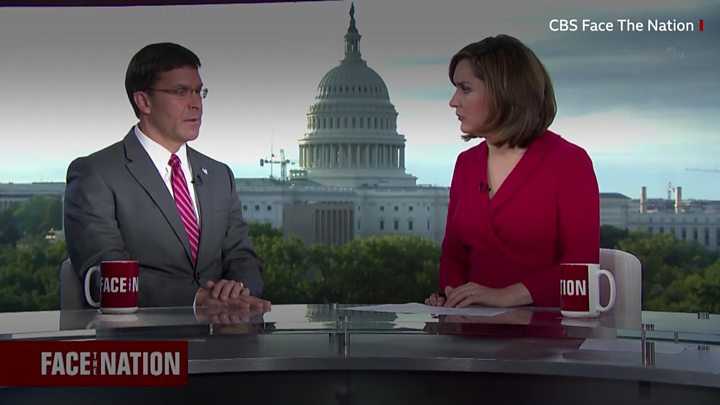
Media playback is unsupported on your device
On Sunday, President Trump tweeted that it was “very smart” not to be involved in the fighting “for a change”, saying engagement in Middle East conflict was a mistake.
What has Turkey seized so far ?
Turkey has been pushing deeper into northern Syria since last week.
On Sunday, President Erdogan said his forces had already captured 109 sq km (42 square miles) of territory, including 21 villages.
He told reporters the key border town of Ras al-Ain had come under Turkish control – though the SDF said they had pushed Turkish forces back to the town’s outskirts.
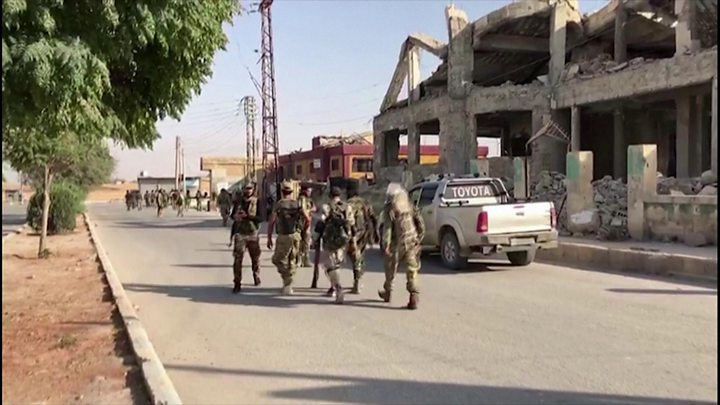
Media playback is unsupported on your device
Mr Erdogan said Turkish forces had also besieged the town of Tal Abyad, some 120km away.
The UK-based monitoring group the Syrian Observatory for Human Rights (SOHR) said Turkey was in almost complete control there.
Both Ras al-Ain and Tal Abyad are key goals in the Turkish offensive against the SDF.
Turkey also announced that its Syrian allies on the ground had seized a key motorway – called the M4 – some 30-35km south of the border.
The town of Tal Tamer, which Syrian government forces are said to have entered, is about 35km from Ras al Ain.
What are the casualty figures?
Civilians have been killed on both sides of the border:
- More than 50 civilians and over 100 Kurdish fighters killed in north-eastern Syria, SOHR says
- The SDF says the Kurdish forces’ death toll is 56 and Turkey gives a higher figure of 440
- Eighteen civilians killed in southern Turkey, according to Turkish reports
- Four Turkish soldiers and 16 pro-Turkish Syrian fighters killed in Syria, Turkey says
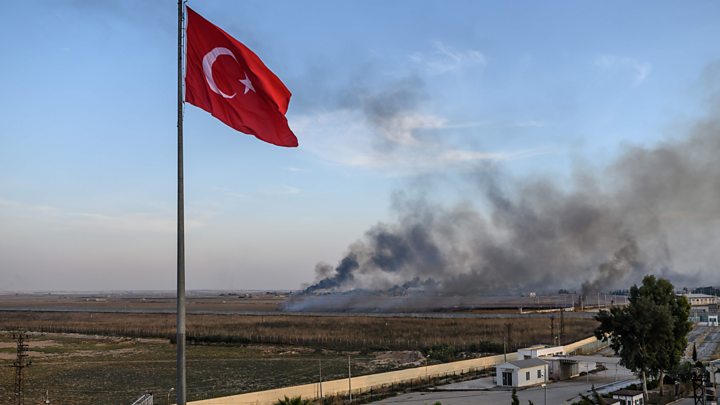
Media playback is unsupported on your device
The UN humanitarian agency OCHA says up to 160,000 civilians are now on the move and it expects the number to rise. It says it is increasingly concerned about the safety of its staff in the region.
What about IS?
The fighting has spilled over to areas close to IS detainee camps.
Fears that Kurdish forces will be unable to keep IS prisoners confined appeared to have been realised when officials at the Ain Issa camp said nearly 800 relatives of foreign IS members had escaped.
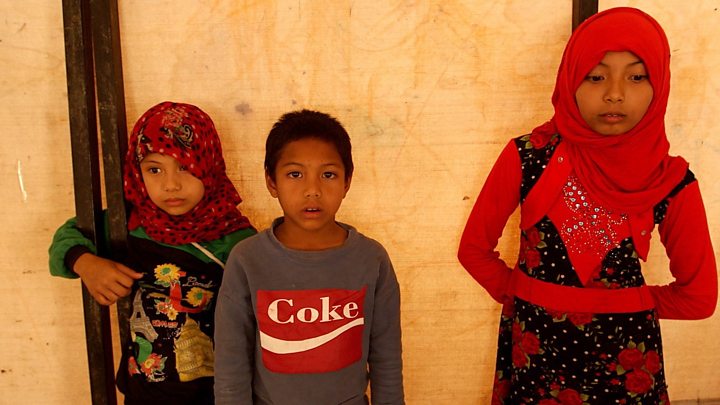
Media playback is unsupported on your device
The camp holds about 12,000 displaced people, previously including nearly 1,000 foreign women and children with jihadist links.
The SDF says it is currently holding more than 12,000 suspected IS members in seven prisons, and at least 4,000 of them are foreign nationals.
IS has claimed recent car bombings and on Saturday declared a new campaign in Syria.
Turkey says it will take responsibility for IS prisoners it finds during its offensive.




